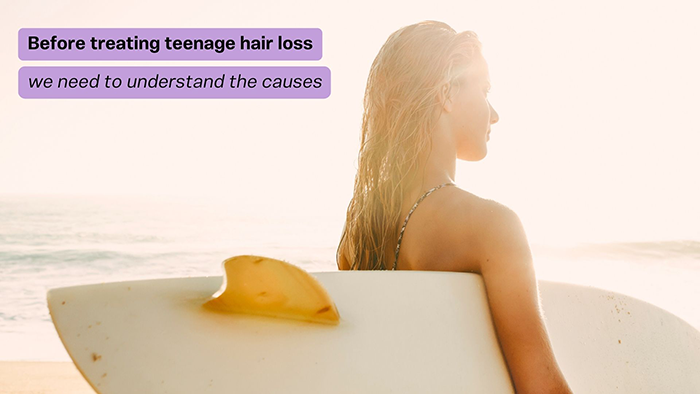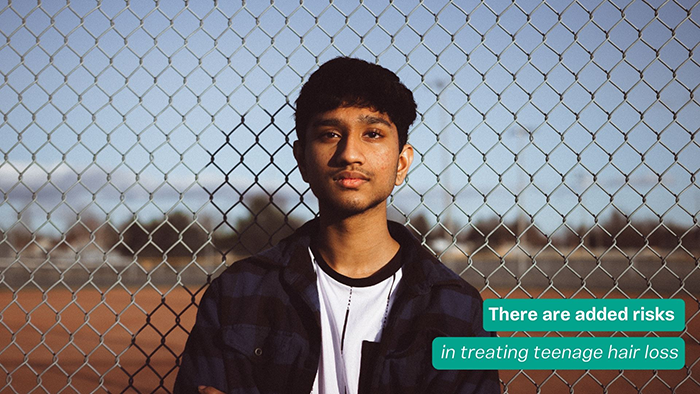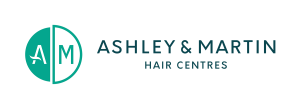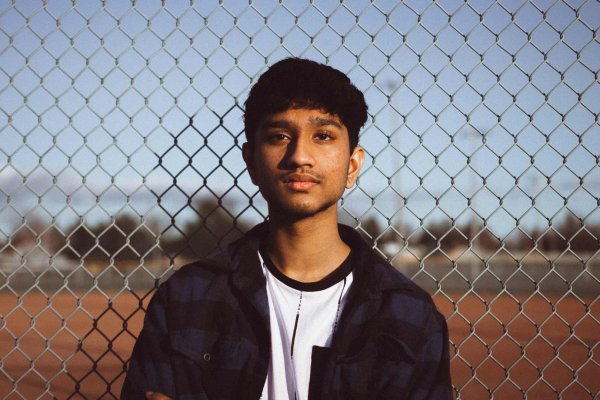How young is too young when it comes to hair loss?
Despite what many think, going bald isn’t just for the oldies. In fact, many young men and women in their early 20’s or even their teenage years start to notice their hair thinning or a receding hairline.
The good news is, with the right medical advice to identify and treat the underlying causes, there are safe and affordable solutions for people of all ages.

What causes teenage hair loss?
While hair loss is more common than most people think, it can be missed as the hair sheds over time. So, someone noticing their hair loss in their 30’s may have been shedding hair since their teen years or early 20’s. It’s generally accepted that by the time you’ve noticed your thinning hair, you’ve already lost 50%.
Before hair loss can be treated, we first need to understand what’s causing it. Some common medical conditions that can contribute to hair loss in young people include:
Alopecia Areata: This is an autoimmune disorder in which the immune system attacks the hair follicles, resulting in patchy hair loss. It can occur at any age, including during adolescence.
Telogen Effluvium: This condition is characterised by a widespread shedding of hair due to a disruption in the hair growth cycle. It can be triggered by physical or emotional stress, nutritional deficiencies, hormonal changes, certain medications, or underlying medical conditions.
Thyroid Disorders: Imbalances in thyroid hormone levels, such as hypothyroidism (underactive thyroid) or hyperthyroidism (overactive thyroid), can contribute to hair loss in young individuals. Proper diagnosis and treatment of the underlying thyroid condition are essential.
Scalp Infections: Infections of the scalp, such as ringworm (tinea capitis), can lead to temporary hair loss. These infections are typically caused by fungal or bacterial agents and require appropriate medical treatment.
Trichotillomania: This is a psychological disorder characterised by a compulsive urge to pull out one’s hair. It often begins during childhood or adolescence and can result in noticeable hair loss if left untreated. Behavioural therapy and counselling are typically recommended for managing trichotillomania.
Systemic Diseases: Certain systemic diseases, such as lupus, diabetes, and autoimmune conditions, may contribute to hair loss in young individuals. Treatment for these underlying diseases, along with targeted management of hair loss, is necessary.
To effectively identify the causes of any hair loss, an experienced medical professional will need to conduct a thorough examination. From there, treatments may be prescribed that are appropriate for the individual’s specific condition, lifestyle and age.

Risks treating teenage hair loss
Treating hair loss in young people requires special consideration due to their unique physiology. As young bodies continue to develop, they are also experiencing hormonal changes. Popular prescription medication treatments such as androgen blockers, affect hormones, so carry additional risks.
If taken without proper medical supervision, these risks may include:
1) Hormonal Imbalance: Androgen blockers work by inhibiting the conversion of testosterone into dihydrotestosterone (DHT), a hormone associated with hair loss. However, hormonal balance is crucial during adolescence for proper growth and development. Introducing medications that disrupt hormonal levels can potentially interfere with normal physiological processes.
2) Growth and Development: Teenagers are still in a phase of active growth, including the development of secondary sexual characteristics. Androgen blockers may impact these processes, as DHT plays a role in sexual development. Therefore, altering hormonal levels with medication can potentially affect the normal progression of puberty.
3) Risk of Side Effects: It is also important to recognise that androgen blockers do carry the risk of potential side effects such as sexual dysfunction, decreased libido, mood changes, and breast enlargement in males (gynecomastia). While these risks are low and can be managed under the close supervision of a medical professional, they can have significant impact on the emotional wellbeing of young hair loss sufferers.
Given these considerations, the use of androgen blockers in teenagers for treating hair loss should be carefully evaluated on a case-by-case basis. It is essential for teenagers to consult with a qualified healthcare professional who are experienced in treating hair loss in this age group. The healthcare professional can assess the individual’s unique situation, discuss potential risks and benefits, and provide appropriate guidance and alternative treatment options that are safer for teenagers.
Dangers of self-medicating
While the internet offers a wealth of information, it’s essential to prioritise professional medical advice. While budget self-medication options can be found, they come without a thorough understanding of your unique situation. A doctor can assess your medical history, conduct necessary tests, and recommend appropriate treatments. They can also monitor your progress and adjust your treatment plan if needed, to mitigate the risk of any side effects and ensure your overall well-being.
Safe and effective treatments for teenage hair loss
Fortunately, there are several safe and effective treatment options available for young people experiencing hair loss. These include:
1) Low-Level Laser Therapy (LLLT): This non-invasive treatment uses red light to promote hair growth and improve hair thickness. LLLT devices are available for home use or can be administered in a clinic setting.
2) Nutritional Supplements: A balanced diet, rich in vitamins, minerals, and proteins, is essential for healthy hair growth. Your doctor may recommend specific supplements to address any nutritional deficiencies contributing to your hair loss.
3) Prescription medications: while any topical or oral prescription medications should be used with caution, they may be safe and effective treatments in certain circumstances. The key to determining the suitability of prescription medication treatments is consultation at a medical clinic, experienced in treating hair loss.
4) Combination of treatments: In most cases there are multiple factors that contribute to hair loss. So, it should come as no surprise that using a combination of treatments has proven to be the most effective way to address everything going on; and return the best results in promoting hair regrowth and improving overall hair health.
Take control of your hair loss
Experiencing hair loss at a young age can be stressful, but it is a very treatable condition. To take control of your hair loss, you just need the right care that will get to the root cause of your condition.
Ashley & Martin, are the leading authority in hair loss treatment and offer free consultations to help you find the right program for your hair loss. Our experts can assess your situation, provide clarity on available services, and guide you towards the best solution.
If you are under 18 years of age, make sure you bring a parent or guardian to the appointment.

